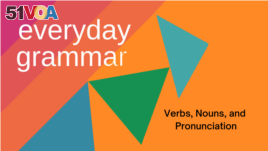Consider the words building, window, and garden. What do all of them have in common?
Now consider the words produce, succeed, and employ. These, too, have something in common.

You will learn the answers to these questions in today’s report.
In this Everyday Grammar, we will explore the link between grammar and pronunciation. You will learn about how Americans pronounce nouns and verbs that have two syllables.
Let's start with a few important ideas and terms.
Verbs, nouns, syllables
A noun is the name of something - a person, place, thing, or idea. Building, window, and garden are three examples.
A verb is a word that expresses an action or state of being. Common verbs include like, want, be, or think. You heard three other verbs at the beginning of the report: produce, succeed, and employ.
The final terms you should know about are syllable and stress.
A syllable is any one of the parts into which a word is divided when it is spoken. A syllable generally has a vowel or a vowel and one or more consonant sounds.
Stress means saying something louder or in a higher pitch.
Let’s consider some examples that include these ideas.
Consider the noun ball. It has one syllable.
Consider the noun computer. It has three syllables.
/kəmˈpjuːtɚ/
In longer words, Americans generally stress one syllable more than other syllables. This is part of what makes American English sound like it does. In our example about the word computer, the stress is on the middle part of the word – pu.
/kəmˈpjuːtɚ/
Now, you might be asking yourself about the connection between syllables, verbs, and nouns.
The answer is this: Americans generally stress two-syllable verbs and nouns in regular ways. Syllable stress is important for showing the difference in meaning.
For the purposes of today’s report, we will explore nouns and verbs with two syllables. Longer words are a bit more complicated.
Consider these two words: produce and produce.
The first word, produce, is a noun. It means food, such as fruits or vegetables. So, a person might say:
I love that store! It has such lovely produce.
Note that in the noun produce, the stress is on the first syllable of the word.
Now let’s consider produce, the verb. It means to make something.
A person might say:
That company produces 1,000 cars every year.
Note that in the verb produce, the stress is on the second syllable of the word.
Exploring stress in verbs and nouns
The general idea is that in words with two syllables, nouns have stress on the first syllable and verbs have stress on the second syllable.
We started this report with a question:
Consider the words building, window, and garden. What do all of them have in common?
The answer is that these words are all nouns that have two syllables. They also have stress on the first syllable.
Now consider the words produce, succeed, and employ. These are all verbs with two syllables. They all have stress on the second syllable.
Closing thoughts
In today’s report, we explored one of the points of connection between grammar and pronunciation. The next time you want to pronounce an unusual English word, ask yourself if it is a noun or verb. If you can tell if the word is a noun or verb, then you have a better chance at guessing the correct syllable stress.
I’m John Russell.
John Russell wrote this lesson for VOA Learning English. Susan Shand was the editor.
_____________________________________________________________
Words in This Story
pronunciation – n. the act of making the sound of (a word or letter) with your voice
syllable – n. any one of the parts into which a word is naturally divided when it is pronounced
